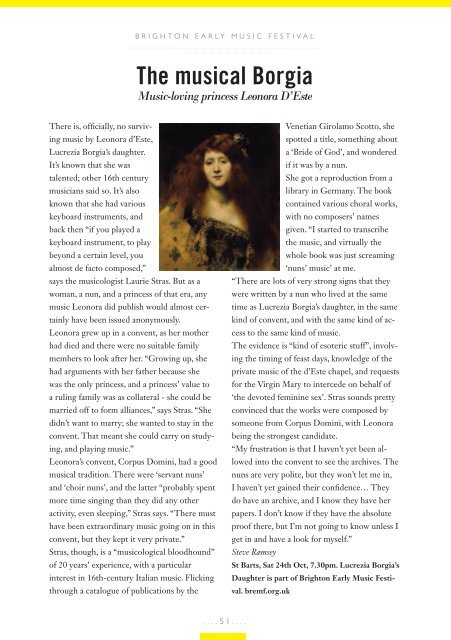Viva Brighton October 2015 Issue #32
- No tags were found...
You also want an ePaper? Increase the reach of your titles
YUMPU automatically turns print PDFs into web optimized ePapers that Google loves.
ighton early music festival<br />
................................................<br />
The musical Borgia<br />
Music-loving princess Leonora D’Este<br />
There is, officially, no surviving<br />
music by Leonora d’Este,<br />
Lucrezia Borgia’s daughter.<br />
It’s known that she was<br />
talented; other 16th century<br />
musicians said so. It’s also<br />
known that she had various<br />
keyboard instruments, and<br />
back then “if you played a<br />
keyboard instrument, to play<br />
beyond a certain level, you<br />
almost de facto composed,”<br />
says the musicologist Laurie Stras. But as a<br />
woman, a nun, and a princess of that era, any<br />
music Leonora did publish would almost certainly<br />
have been issued anonymously.<br />
Leonora grew up in a convent, as her mother<br />
had died and there were no suitable family<br />
members to look after her. “Growing up, she<br />
had arguments with her father because she<br />
was the only princess, and a princess’ value to<br />
a ruling family was as collateral - she could be<br />
married off to form alliances,” says Stras. “She<br />
didn’t want to marry; she wanted to stay in the<br />
convent. That meant she could carry on studying,<br />
and playing music.”<br />
Leonora’s convent, Corpus Domini, had a good<br />
musical tradition. There were ‘servant nuns’<br />
and ‘choir nuns’, and the latter “probably spent<br />
more time singing than they did any other<br />
activity, even sleeping,” Stras says. “There must<br />
have been extraordinary music going on in this<br />
convent, but they kept it very private.”<br />
Stras, though, is a “musicological bloodhound”<br />
of 20 years’ experience, with a particular<br />
interest in 16th-century Italian music. Flicking<br />
through a catalogue of publications by the<br />
Venetian Girolamo Scotto, she<br />
spotted a title, something about<br />
a ‘Bride of God’, and wondered<br />
if it was by a nun.<br />
She got a reproduction from a<br />
library in Germany. The book<br />
contained various choral works,<br />
with no composers’ names<br />
given. “I started to transcribe<br />
the music, and virtually the<br />
whole book was just screaming<br />
‘nuns’ music’ at me.<br />
“There are lots of very strong signs that they<br />
were written by a nun who lived at the same<br />
time as Lucrezia Borgia’s daughter, in the same<br />
kind of convent, and with the same kind of access<br />
to the same kind of music.<br />
The evidence is “kind of esoteric stuff”, involving<br />
the timing of feast days, knowledge of the<br />
private music of the d’Este chapel, and requests<br />
for the Virgin Mary to intercede on behalf of<br />
‘the devoted feminine sex’. Stras sounds pretty<br />
convinced that the works were composed by<br />
someone from Corpus Domini, with Leonora<br />
being the strongest candidate.<br />
“My frustration is that I haven’t yet been allowed<br />
into the convent to see the archives. The<br />
nuns are very polite, but they won’t let me in,<br />
I haven’t yet gained their confidence… They<br />
do have an archive, and I know they have her<br />
papers. I don’t know if they have the absolute<br />
proof there, but I’m not going to know unless I<br />
get in and have a look for myself.”<br />
Steve Ramsey<br />
St Barts, Sat 24th Oct, 7.30pm. Lucrezia Borgia’s<br />
Daughter is part of <strong>Brighton</strong> Early Music Festival.<br />
bremf.org.uk<br />
....51....


















